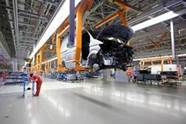The recent job losses due to the pandemic in the automotive industry and its supplying industry worldwide have shown that the future of the automotive industry must be sustainable and climate neutral. How must a just transition look like? A conference organised by the Rosa-Luxemburg-Stiftung Brussels Office.
With regard to the next climate summit COP26 and the Sustainable Development Goals (SDGs) it is clear that the announcements of climate neutrality in 2050 cannot be the only signal of climate ambition and will certainly not be enough to guarantee justice and survival for the most vulnerable now.
Investments need to be attracted to make the transport sector compatible with the Paris Agreement objectives, that means massive investments in public transport and rail traffic are necessary. For this we need a progressive industrial policy which creates alternative employment and transforms parts of the automotive industry. We have to put climate friendly solutions on the agenda of cities and communities, so that people can see what a “just transition” in the transport sector means, that it tangibly improves their daily lives.
We need a new social contract to create climate friendly jobs with “just transition”, ensuring rights for all workers, universal social protection, equality which will end discrimination and inclusion to make sure that no one will be left behind. Because all workers are affected by climate change and we need a “just transition” for the automotive sector, as well as in the energy sector.
Thursday, 15 July 2021
18:00 (CET)
Languages
Interpretation in German, English and Spanish
In the framework of the public conference we will discuss the following questions:
- How must a just transition for the automotive sector look like?
- How can be ensured that workers can organize themselves, that collective bargaining is allowed, that freedom of association is guaranteed?
- What kind of industrial policy do we need to strengthen public transport and rail traffic?
- How can we strengthen the solidarity among workers in the European Union and worldwide?
- How can we transform parts of the automotive industry to an ecological mobility industry for rail traffic and public transport?
- How can we build alliances between the trade unions and the climate movement?
- How can we win societal support for a fundamental transport transformation towards rail traffic and public transport?
Speakers:
- Benjamin Denis, IndustriALL (trade union) (confirmed)
- Ulrike Eifler, DIE LINKE., candidate for national elections; spokesperson working group enterprise and unions (confirmed)
- Katharina Stierl, Students for Future (confirmed)
- Karoly Gyorgy, International Secretary, Hungarian Trade Union Confederation, Hungary (confirmed)
Moderation:
- Manuela Kropp, RLS Brussels
